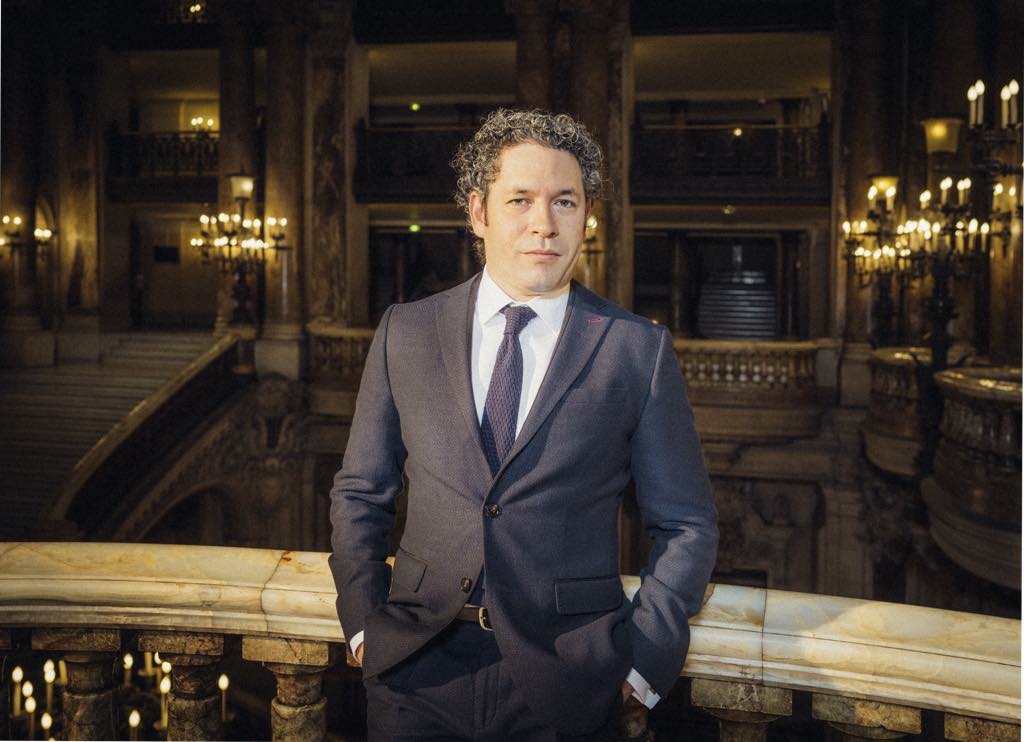
In a major coup for the Opéra National de Paris, the Venezuelan conductor Gustavo Dudamel was unveiled (almost literally, given the fact that he had to remove a face mask before speaking) this week to the press at the Palais Garnier as the incoming music director at both the Garnier and Bastille opera houses. He will succeed the Swiss conductor Philippe Jourdan in August of this year and has been appointed initially for six seasons.
Dudamel (whose name seems already to have been gallicized by some at the Opéra de Paris to Duhamel) is best known for his work with El Sistema, an extraordinarily successful youth music program in Venezuela, and has been artistic director of the Simón Bolívar Symphony Orchestra since 1999 and of the Los Angeles Philharmonic since 2005.
While Dudamel has an excellent reputation in the symphonic repertoire, he is less experienced in conducting opera, so his appointment does represent a risk. However, his undoubted starry quality – he is much more outgoing than Jourdan, whose tenure at the Opéra has nonetheless been a triumph – probably makes it a worthwhile risk to take. His musical track record, flair and intelligence are sure to take him a long way, even though the deep-set traditions of the Opéra de Paris may present obstacles he has not encountered thus far in his career. The fact that he spoke in Spanish via an interpreter at the press conference suggests that he knows very little French, and it is hoped that he will learn the language quickly, as I suspect that the fact that Jourdan is French-speaking worked in his favor during his time at the Paris Opera.
Dudamel’s response to my question at the press conference about the operatic repertoire that he would like particularly to explore was extremely vague – “I want to explore everything, with lots of possibilities” – but he probably does not want to alienate any of the traditionalists or new music buffs at this early stage. However, he did let on that he had plans to conduct some ballet music by the British composer Thomas Adès, and he will be conducting the comparatively safe choices of Puccini’s Turandot and Mozart’s Marriage of Figaro during the forthcoming season. Alexander Neef, the general director of the Opéra National de Paris, said that Dudamel would be involved in a greater number of productions in the following seasons.
If Dudamel manages to explore the wide range of operatic material that marked Jourdan’s tenure and if he brings some of his innovative and reforming zeal to Paris, attracting younger audiences in the process, his partnership with the Opéra National de Paris will surely be a success. I for one can’t wait to be sitting in an auditorium, finally enjoying live opera again and (we hope) applauding the artistic endeavors of Paris Opera’s new maestro.
Nick Hammond’s latest book, The Powers of Sound and Song in Early Modern Paris, is now available in paperback and as an e-book here and from online vendors.
Favorite
Would love to know the date of Gustavo Dudamel’s first opera.
Keep an eye on the Paris Opera’s website or sign up for their free newsletter: https://www.operadeparis.fr/en/